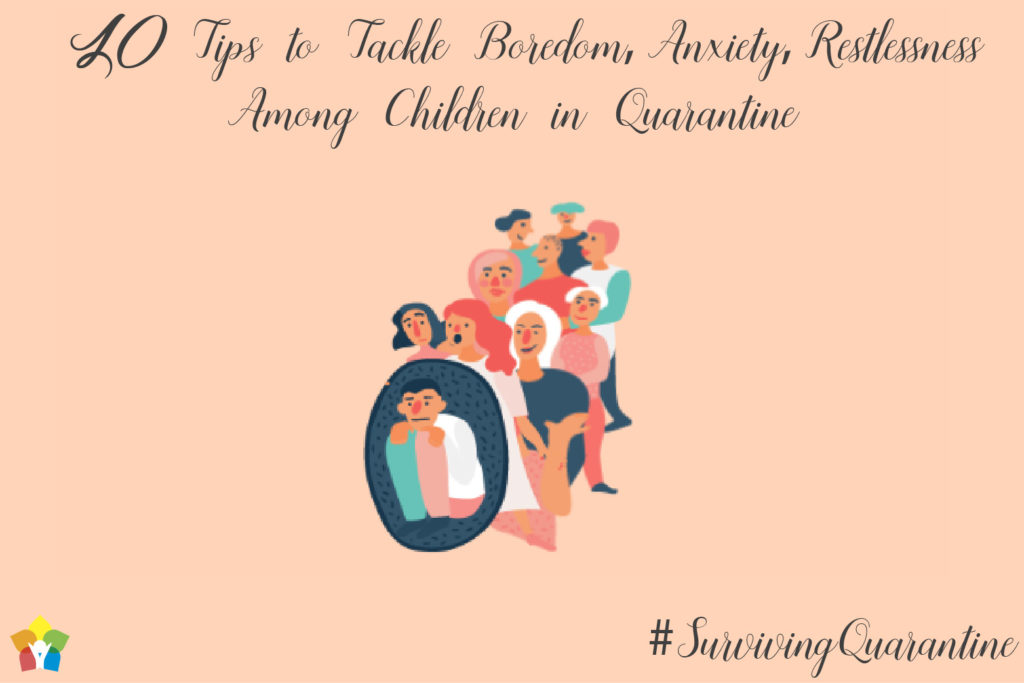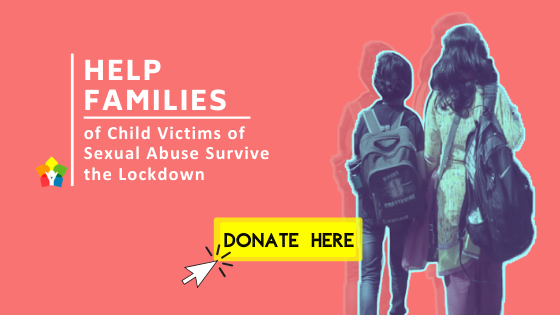10 Tips to Tackle Boredom, Anxiety, Restlessness among Children in Quarantine

Boredom : It is a constant feeling of being disinterested in one’s surroundings.
When a child has no peer group to play regularly with, lack-of engaging or interesting surroundings or has to follow the same inflexible routine he/she/they might find it difficult to focus on a given task or display anger and resentment and might even show resistance. Thus it is important to understand that boredom in children isn’t always about being lazy or acting out but can be a genuine result of the mundaneness of their surroundings.
Anxiety: It is a feeling of worry, nervousness or unease about something with an uncertain outcome.
Anxiety in children may be seen as Agitation, Restlessness, Inattention, avoidance, clinginess and even as somatic symptoms such as body ache, upset stomach etc. During these (pandemic) times, health anxiety might also occur, where one is obsessed with the idea of being vulnerable to, or having an undiagnosed disease or ailment.
Restlessness: It is the inability to rest or relax and a constant feeling of unease.
Restlessness can be a resultant of anxiety or boredom.
Quick tips to tackle boredom, anxiety & restlessness during the lockdown:
1. Create an optimistic narrative
Changing the narrative of the situation from ‘We are stuck in the house because of the lockdown’ to ‘We chose to stay inside to be safe’ can help children feel better about the situation and help them take ownership for their own safety, at least for the time being.
Positive affirmations which are phrases/mantras that are repeated to self can be explained to children especially when they feel anxious. The statements can be as simple as ‘I am safe and secure’ to ‘we are going to get through this’. These statements can also act as immediate soothers when repeated during an anxiety attack.
2. Facts not Fear!
Avoid extreme flooding of news related to Covid-19 or the lockdown , as it might lead to further anxiety in children. Explaining through facts rather than fear can be really crucial during these times, especially while dealing with kids who are anxious and confused about what is happening around. The nature of news might not only be heavily filtered but also extremely scary especially when a child doesn’t have a complete understanding of what is happening. It would be a good practice to ensure that you are taking all the necessary precautions whenever you have to step out etc. while offering proper information from official sources to the children.Fear can raise a permanent alarm in a child’s mind and thus even in situations where they are seemingly secure it might create a trigger for the future. Thus explaining things in a factual and cognitive way will always be preferable than fear based explanations.
3. Use all sensations to resist anxiety
During this time, parents might experience their kids getting restless even for minute things, can try basic activities that can help concentrate on the present and be more mindful about the surroundings which are also called Grounding techniques. Parents can help children calm down using deep breathing techniques, using play dough, fuzzy or stress balls to soothe restless sensations, watching visually calming videos with serene music or guided meditation etc. Younger children can be soothed with story reading, sleeping in a comforting space, or with pillows around.
(click here for a link to grounding exercises you can do with children)
4. Involve kids in everyday domestic chores
Involving kids in the everyday domestic chores, like washing dishes, folding clothes, picking up toys, sorting cupboards can make them feel included and productive. This might also help give a structure to their day and feel useful. A routine will always help to curb the vagueness and uncertainty that comes with lack of structure or rhythm and bring more stability and comfort to their day.
5. Scheduling a thing to look forward to
Planning the week such as there are activities to look forward to, where a favorite activity, movie, food preparation can be revisited. This instills a hope in children, and a fear of ‘what next?!’ can be successfully curbed. You can create weekly meetings with the family (mock professional) to mitigate current issues and appreciate the tasks done in the previous week and also plan for the week ahead.
6. Doing yearly activities together at home.
Engaging in group activities as a family, like making long lasting food which is made every year (Papad, pickles) or making simple homemade desserts (ice-lollies), with minimal resources which will engage kids for a long time. Watching television shows, playing indoor games or even praying together can also be activities that might set a rhythm to the day. Engagement and involvement of the family creates an environment of support and comfort anxious thoughts that arise from fear of not being understood or emotional isolation. It may be vital especially when children cannot meet their friends or play together in groups.
7. Hopeful Letter to self
Writing a letter to your future self (a few months ahead), and keeping it safe to open it up later can also help, as it creates a sense of hope. Parents can seal it in front of the kids and set a date on which it will be shared. This might also help curb restlessness that the child may be feeling due to the uncertainty of the situation.
8. A Right Time for ART!
Use of colours to paint, doodle, sketch, draw mandalas etc. Using things that are available at home like using coffee, beetroot, turmeric, lime juice, Indigo ink to paint and flour dough or clay to make things and play.. Older kids might be interested in home remedies for self-care of their physical health/ appearance. (will help to pass time as well as curb body image anxiety in teens). Kitchen gardening can be done with available materials like old pots, containers, dustbins etc. Growing something might be great for a sense of accomplishment, usage of time and also instill hope! Art also helps in engaging almost all the sensations which will keep the child more mindful and in present rather than anxious.
(click here for some mindful art exercises)
9. Anxiety and the immune system.
Explaining children the negative effects that anxiety has on their immune system can be seen as a useful way of shaping their fear reactions. Instead replacing anxious thoughts with things that will boost their immunity, like physical activity, healthy sleep hours, and a healthy appetite can be a constructive way of shaping behaviour while successfully curbing anxious thoughts in children.
10. Worry begets Worry-ers (especially when they’re young!)
Younger children mimic their caregivers in behaviour, so anxiety in parents will consequently create anxiety in children, thus dealing with anxious thoughts and knowing the appropriate responses while children ask questions or defy set house rules rather than just emotional explosion. It might be important to acknowledge that it is going to be difficult to be ‘stuck in’ but if done in the right way( by doing things we know for our safety) it is a temporary situation, which can be sprung out of. Not to panic if assigned tasks are not completed on the planned day, instead planning on how your days can be divided and assigned in a functional and practical way with understanding what works and what doesn’t (it’s all trial and error!) As this year, things might look different with children stuck at home during vacations, it might get difficult to manage heightened emotions over a period of time.
(If you like this article, please consider donating to our ongoing donation drive to Help Families of Sexual Abuse Victims in Mumbai Survive the Lockdown)









It is very useful to read the many guidelines to address the multiple emotional and practical situations arising in the pandemic/lockdown sirtuatyionm.
Will you permit me to add the above matwerial in my blogpost( it is visited by more than 1000 visitors in the last one month). .
Scope of the Blog:The COVID 19 section of the Blog with be called 3 ‘Ss’ for Success.The posts will cover(i) Sense Making (Scientific Information); (ii) Self Care (Skills for Emotional Health; and(iii) Stories (Narratives of Pandemic). Please visit and reply.
Thank you,
Prof.R.Srinivasa Murthy